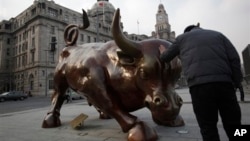DALIAN, CHINA —
Chinese Premier Li Keqiang pledged on Wednesday to push ahead with reforms, with financial system change at the center of his agenda, noting that the world's second-largest economy was stable but there was a need to guard against risks.
Li also said in a speech to government leaders and company executives at the World Economic Forum in the northeastern port city of Dalian that China will keep its monetary policy stable even if capital markets show volatility.
"China is at a critical stage of restructuring and updating its economy," Li said. "China's economic fundamentals are good and economic operations are stable.
“China can only sustain economic growth by transforming its growth model. Financial reform is one of the important parts of China's economic structural reform,” he added, noting that convertibility of the yuan currency and interest rate reform will be the focus.
"But we should also be aware that the foundation of economic recovery is not yet solid and there remain many uncertain factors. We should not lower our guard against downside risks and must make all necessary preparations to conquer difficulties and challenges."
Li, who took office this year, has an ambitious plan to restructure China's economy away from credit, investment and export driven growth to one where consumers provide the main impetus.
He has said he will accept slower growth rates in order to push ahead with reform, though has had to introduce policies to stabilize the economy after a sharper-than-expected slowdown threatened to derail the reform push.
Recent economic data has shown some of the impact of those policies, with factory output in August hitting a 17-month high and retail sales growing at their fastest pace this year.
"The major economic indicators for July and August, ranging from PMI, PPI, industrial output, trade to power generation and cargo freight, have all improved and the urban employment continued to increase, inflation remained stable, market sentiment is boosted," Li said. "This growth momentum makes us confident to say that China is able to achieve the growth target for this year."
The government's target is 7.5 percent.
Li has rejected the idea of using stimulus to push growth, mindful of the risk of a debt overhang should too much money flow into the economy. Total social financing, a measure of liquidity in the economy, surged in August, pointing to strong demand for credit.
"On the fiscal policy front, we will not expand our fiscal deficit but will improve the expenditure structure by cutting administration fees and increasing spending in some key areas, such as western regions, social welfare projects and smaller firms," he said.
"As for monetary policy, we will not relax or tighten the monetary stance and the main focus will be on using well the existing pool of liquidity to support the real economy and structural reform," Li said, adding that China would handle any money market volatility "calmly."
Li also said in a speech to government leaders and company executives at the World Economic Forum in the northeastern port city of Dalian that China will keep its monetary policy stable even if capital markets show volatility.
"China is at a critical stage of restructuring and updating its economy," Li said. "China's economic fundamentals are good and economic operations are stable.
“China can only sustain economic growth by transforming its growth model. Financial reform is one of the important parts of China's economic structural reform,” he added, noting that convertibility of the yuan currency and interest rate reform will be the focus.
"But we should also be aware that the foundation of economic recovery is not yet solid and there remain many uncertain factors. We should not lower our guard against downside risks and must make all necessary preparations to conquer difficulties and challenges."
Li, who took office this year, has an ambitious plan to restructure China's economy away from credit, investment and export driven growth to one where consumers provide the main impetus.
He has said he will accept slower growth rates in order to push ahead with reform, though has had to introduce policies to stabilize the economy after a sharper-than-expected slowdown threatened to derail the reform push.
Recent economic data has shown some of the impact of those policies, with factory output in August hitting a 17-month high and retail sales growing at their fastest pace this year.
"The major economic indicators for July and August, ranging from PMI, PPI, industrial output, trade to power generation and cargo freight, have all improved and the urban employment continued to increase, inflation remained stable, market sentiment is boosted," Li said. "This growth momentum makes us confident to say that China is able to achieve the growth target for this year."
The government's target is 7.5 percent.
Li has rejected the idea of using stimulus to push growth, mindful of the risk of a debt overhang should too much money flow into the economy. Total social financing, a measure of liquidity in the economy, surged in August, pointing to strong demand for credit.
"On the fiscal policy front, we will not expand our fiscal deficit but will improve the expenditure structure by cutting administration fees and increasing spending in some key areas, such as western regions, social welfare projects and smaller firms," he said.
"As for monetary policy, we will not relax or tighten the monetary stance and the main focus will be on using well the existing pool of liquidity to support the real economy and structural reform," Li said, adding that China would handle any money market volatility "calmly."
